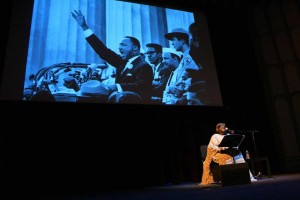University honors MLK with celebration in Bovard
Members of the university and community paid tribute to the life and legacy of Martin Luther King Jr. at the Martin Luther King Jr. Celebration, hosted by USC Black Staff and Faculty Caucus in Bovard Auditorium on Thursday.

Gospel of truth · Thorton alumna and distinguished guest Lura Daniels-Ball sang at USC’s 31st annual Martin Luther King Jr. Celebration in Bovard Auditorium Thursday. - Razan Al Marzouqi | Daily Trojan
The 31st annual event included spoken word, songs and personal experiences with King. One purpose of the celebration was to inspire students to honor the integral part King played in shaping higher education, said Cynthia Brass, administrative assistant of recreational sports and coordinator of the event.
“Some still don’t understand the concept of King as far as his contribution to allowing minorities the opportunity to be a student at a university,” Brass said. “It’s to make sure they know that because Dr. King opened several doors, they were able to get as far as they are today.”
Makiah Green, a junior majoring in English, said recognizing King also results in the remembrance of other leaders that have influenced society.
“Black history in this country is often forgotten, and he seems like the only icon that is really remembered,” Green said. “He allows people to segue into introducing other forgotten heroes.”
Najee Ritter, a senior majoring in theater, said King contributed to the diversity on campus through his advocacy of human rights.
“USC is all about leadership and I think he is the quintessential example of leadership,” Ritter said. “A lot of young college students were involved with the movement, and King inspires us to stay active and remain involved in the community.”
Timothy Conley, front office coordinator of the University Religious Center, said his mother, Carloyn Conley-Roper, an undergraduate business administration student during the 1960s, overcame many obstacles of racial inequality at USC while trying to gain her education.
“It was a very different time,” Conley said. “Access and opportunity were limited and not just for the black students. It was challenging to be a student here for anyone that was considered to be a minority.”
Students on campus were eager for change but strategic during the tumultuous time of the movement, Conley said.
“My mother was at USC during the Watt Riots, and that played a lot into the mentality of the students,” Conley said. “They were sick of the vicious racism and they were revolutionary, but they weren’t violent or using any means necessary.”
Vajun Soni, dean of religious life, said although racial prejudice existed at USC in the 1960s, the university was taking progressive actions toward equality.
“The fact that we had black students on campus was actually part of the movement of providing equity and access,” Soni said. “The students represented what the civil rights movement was about, which was developing higher education for all students that deserved to be at all institutions.”
USC has evolved since the Civil Rights Movement and has become a proud part of the L.A. community through its many volunteer efforts, Conley said.
“Dr. King’s movement was about all people embracing and uniting and helping one another. USC is on the forefront of that kind of work,” Conley said. “This is what Dr. King was preaching about. This is what he was fighting for.”
